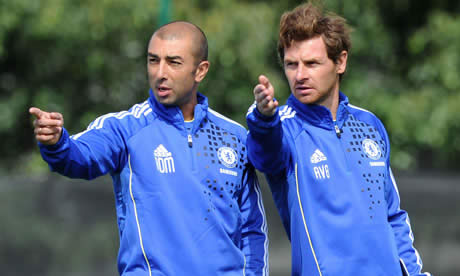Roberto Di Matteo: 'It happened so suddenly … I went into depression'
Posted Thursday, August 04, 2011 by theguardian.com
One of Chelsea's favourite sons talks about the pleasure of his return to Stamford Bridge after the traumatic end to his playing career

Roberto Di Matteo, left, is enjoying the experience of being assistant first-team coach to Chelsea's new manager, André Villas-Boas.
The scarring crumples the skin down the outside of Roberto Di Matteo's left calf, then slices across just above the achilles and extends, remorselessly, up the inside of his leg. The Italian yanks down a sock to show it off properly, though he enjoys no hiding from the triple fracture which ended his career. The dull ache is with him every morning. "It's not pain, but it is uncomfortable," he says. "Every day it reminds me of that night in Zurich. I don't think I will ever forget."
A chapter of Di Matteo's life closed that night against St Gallen almost 11 years ago when an innocuous collision with an opposing defender, Daniel Imhof, splintered the tibia and fibula bones in his left leg. Chelsea had been humiliated, jettisoned from the Uefa Cup by the unfancied Swiss club, but the sombre mood on the flight home was born less of elimination and more the image of the Italian midfielder crumpled helpless on the turf in agony. It would be another 18 months before Di Matteo, by then 31, accepted he would not play again. The years since have taken him through rehabilitation and depression, university and management before, this summer, he secured an unexpected return to Stamford Bridge. He now seems at home.
Restored to the club as assistant first-team coach to André Villas-Boas, it is only natural that, clad again in a Chelsea kit, memories drift back to Zurich. So severe was the damage sustained at Hardturm Stadium that fears were raised whether the leg could be saved. "It took me a long time to digest everything and move on," Di Matteo says. "The incident was an accident, but I only realised four or five days later that things were serious. I spoke to my surgeon and he was honest enough to say: 'Look, before we start thinking about you playing again, we have to make sure you can still lead a normal life.' That's when it kicked in. I might be in trouble.
"I had a lot of complications, nerve problems and soft tissue damage. Bones heal. It was everything else [that went wrong] and, in the end, I never played again. The recovery was day by day. My family were strong and supported me, which was so important because psychologically, mentally, it's very difficult. For most players it's hard to accept you've ended your football career and that you have to go out and do something else. But the way it happened to me, so suddenly … I went into depression and had to deal with that, being depressed, something that had never happened to me in my life before.
"It took four or five years, with me doing other things: television work, coaching courses, a business administration degree [in Switzerland], and an MBA course at the European School of Economics for 14 months, though I never did the dissertation. I still did some things in football, but I needed to get away from the game. I needed closure. And once I felt I'd achieved that, the hunger came back. That fire in your belly, the desire to feel the adrenaline at the weekend. That's when I felt I was able to go again."
He chose to return in England. Having undertaken his coaching qualifications at Warwick University, he was Pete Winkelman's surprise choice to take over at MK Dons – interest was confirmed during a period when Di Matteo was dividing his time between work as a pundit on Swiss television at Euro 2008 and competing in Channel 5's Superstars – and subsequently finished third in League One. In the summer of 2009, with only 12 months of experience behind him, he was headhunted by West Bromwich Albion to lead them back to the Premier League at the first attempt.
This time last year, the Italian was preparing to embark upon his first top-flight campaign as a manager, his reputation as a coach on the rise. By the first week of December, and despite the manager seeing his side thrashed 6-0 on the opening weekend at Stamford Bridge, the Baggies sat eighth in the table having won at Arsenal and squeezed a draw from Manchester United, the only two points Sir Alex Ferguson's side would shed all season at Old Trafford. "People were asking me: 'Where do you see yourself in two years? In a big job?' And then, by February, I was sitting on a beach somewhere unemployed."
Seven defeats in nine league games, and Roy Hodgson's availability, prompted the sack. West Brom survived the campaign, but Di Matteo had been cast from the Hawthorns. "I didn't see it coming, not at all, but I've thought about it since," he says. "Three weeks ago I felt quite happy [that I'd left] because I would not have otherwise had the chance to come here, so life somehow always turns out how it has to go. I did very well [at West Brom] considering what our target was at the time. The footballing industry recognised that, and I guess that is one of the reasons I am sitting here today. I've experienced being a manager and I would love one day to do it again. But I wasn't expecting to be here today so God knows what's round the corner."
For now, the future is a pivotal role in Villas-Boas's new-look set-up. It could be argued that the Portuguese took a risk in recruiting a former Chelsea hero in Di Matteo as his assistant. The 41-year-old is still held in huge affection both for his three goals in Wembley finals – the first, after 43 seconds against Middlesbrough in 1997, helped end the club's 26-year wait for a major trophy – and for personifying the new, cosmopolitan Chelsea that emerged under the management of Ruud Gullit and Gianluca Vialli.
Di Matteo, as a senior player, had actually openly challenged the young Vialli's authority. With neat symmetry, senior figures within the current Chelsea dressing room are still becoming accustomed to calling a 33-year-old "boss".
"André is a clever boy," Di Matteo says. "He speaks five languages and it's amazing how he switches. He knows what he is doing. He's very determined, he's very driven and I don't think he sees anybody as a threat. The biggest change for me, going from manager to assistant, has been the fact that the decision-making goes with him.
"Every day I become a bit more of a support mechanism to the manager. But ours has been a very natural relationship. We understood each other straight away, and our football ideologies are the same. It feels like we have known each other for 30 years." Life as a Chelsea player may have left Di Matteo scarred, but this is a coach who is relishing being back.
Photos
More»Meet sexy model Daniella Chavez
Sunday May 19 2024Former Barcelona star's Wag reveals incredible 'sex deal'
Sunday May 19 2024'World Cup's sexiest fan' reveals she WILL be heading...
Saturday May 18 2024



Your Say